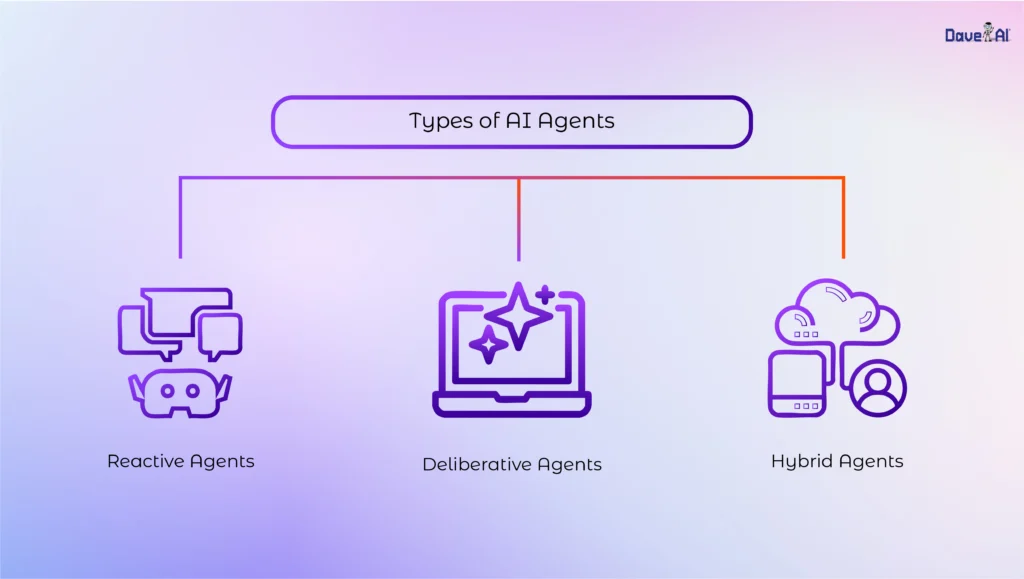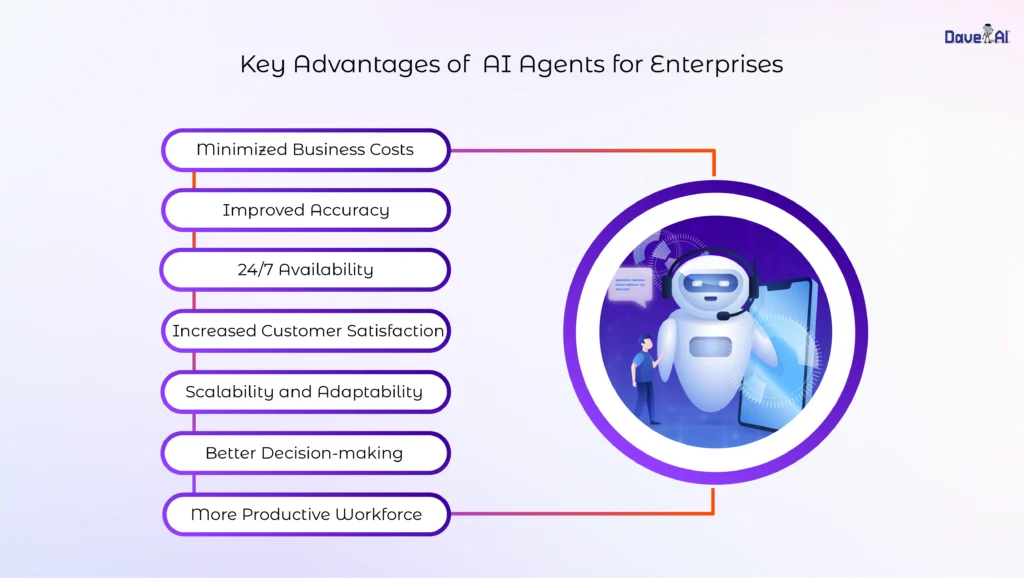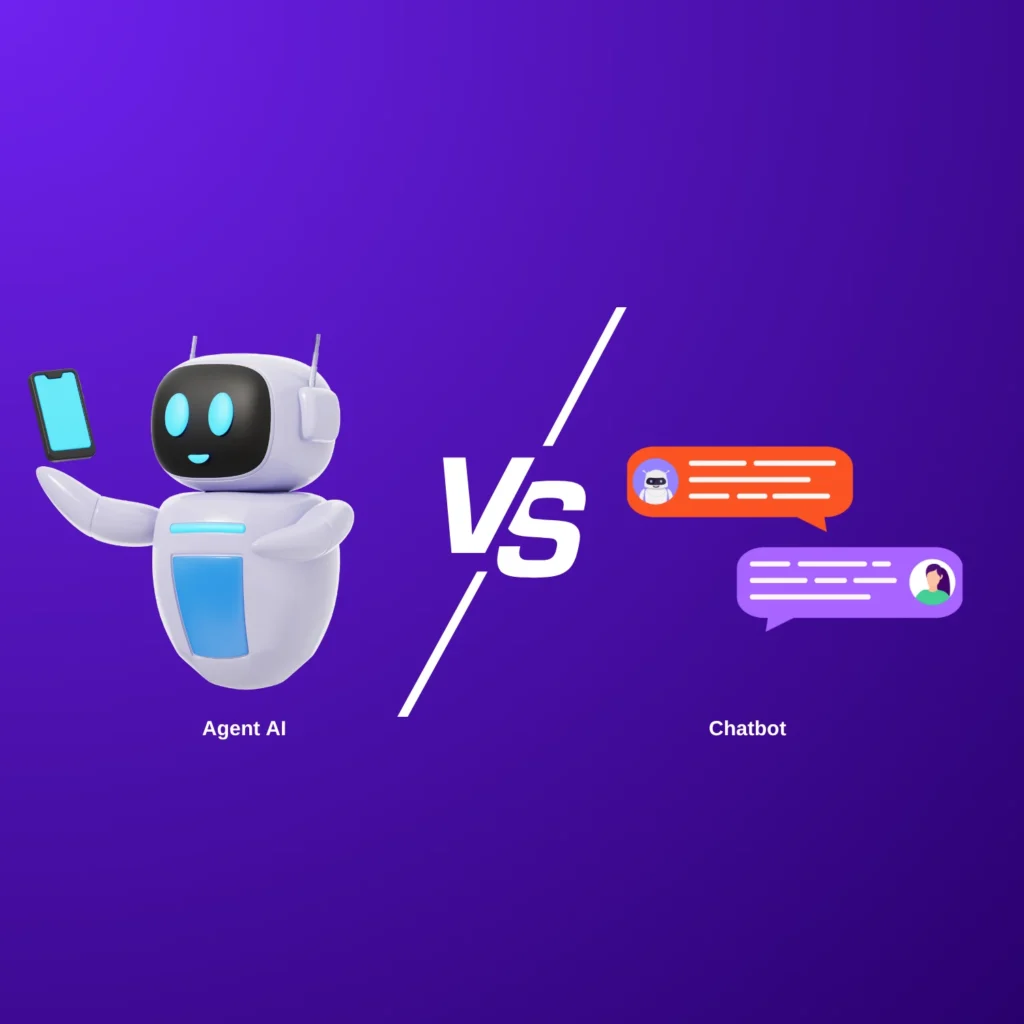AI agents have become a significant part of enterprise systems in the past decade, changing how traditional business processes and decision-making models work.
An (Artificial Intelligence) AI agent is a software program that can easily interact with its environment, gather data, and utilize that data to perform self-determined tasks and meet goals you set.
These Agents evolved from Symbolic AI and basic rule-based systems in the 1970s and 80s to more advanced Generative AI systems in the 2020s, which can now combine internal control systems with external contextual grounding and cognitive input.
So, let’s find out how modern AI agents for enterprises can benefit your business.
How AI Agents Work
AI or Intelligent agents are software entities that can perceive their environment and take action based on it to achieve pre-mentioned goals. These agents are built by integrating different components and utilize specific frameworks and tools.
The main components of AI agents include the following:
Perception Module
An AI agent uses perception powers to analyze and interpret its surroundings, which may include sensors like microphones, cameras, and other data sources required to capture relevant information.
Reasoning Module
AI agents also have the ability to logically reason and make intelligent decisions based on the information they got from their perception. It involves algorithms for decision-making, planning, and problem-solving.
Action Module
The AI-powered agents execute tasks by taking the correct actions after analyzing what they observed in their environment. It means involving user-interfaces or actuators to interact with digital or physical systems.
Learning & Adaptation Module
The agents are perfectly capable of adapting to newly learned patterns and improving their performance accordingly. This component often employs machine learning algorithms, like reinforcement learning, supervised learning, or unsupervised learning.
Communication Module
AI agents utilise the communication module to interact with other entities, such as different bots or human agents. They do so through natural language processing (NLP), dialogue systems, or miscellaneous communication protocols.
With little effort and maybe expert-help, you can integrate these AI agents designed for enterprises into your existing systems, like CRM and ERP. It lets you automate tasks, generate dashboards and real-time reports within your ERP system, get more accurate data and real-time insights, and even enhance your business’s operational efficiency.
Types of AI Agents
Understanding the nature of agents helps you get a better grip on what these powerful Ai systems can do for you. There are broadly three categories of AI agents for enterprises:
Reactive Agents
As the name suggests, these agents react or respond to stimuli in real-time. They operate solely on the present perceptual input, which means that reactive agents don’t keep records of past actions or outcomes and lack the memory feature.
It makes their decision-making process very straightforward but also limited. However , they are pretty quick and consistently efficient in predictable environments.
A perfect example of reactive AI agents is Netflix’s recommendation engine that uses machine learning models. These reactive AI programs process data accumulated from a customer’s viewing history to suggest specific movies and TV shows those viewers will enjoy. If you watch a lot of Horror shows, Netflix will show new releases on your home page.
Deliberative Agents
Second category is deliberative agents, which are highly capable of planning and reasoning considering their actions based on past experiences. For instance, virtual personal assistants like Siri or Alexa, which learn from past interactions to improve their responses.
Deliberative agents’ internal state and memory helps them evaluate different outcomes and scenarios. This feature makes the quality of their decision better and renders them fit for complex problem-solving.
Hybrid Agents
The third variant combines and leverages the strengths of both reactive and deliberative approaches, creating an excellent hybrid. It’s a high performing model of agentic tools, as it integrates immediate responses with strategic planning to cruise smoothly through unpredictable environments.
Hybrid agents make for very versatile versions of AI agents and showcase an enhanced adaptability with dual processing systems.
Autonomous vehicles or self-driving cars like Tesla, Waymo, etc. rely on Light Detection and Ranging (LIDAR), sensors, and radar to analyze and perceive the surroundings. They use deliberative planning to deal with complex environments, make lane change decisions and speed adjustments, and do route optimization considering live traffic data and long-term goals like reaching a location safely in the shortest time.

Applications of AI Agents in Enterprises
Many business functions can be enhanced with AI agentic tools. Some of the most common and productive applications include:
Automating Customer Support
Quick replies impress most people! It’s especially true in the business world. AI-driven agents give instant responses to customer queries, reducing wait times and leaving shoppers happier and more satisfied.
These intelligent agentic programs can easily handle routine product/service related inquiries, troubleshoot common issues, and even guide customers in complex processes, freeing up human agents to pick up more high-value tasks.
Enhancing Decision-Making with Predictive Analytics
Marketing is where you need a thorough research on what the customer likes or wants the most. AI agents can analyze enormous amounts of data and uncover customer behaviour patterns and market trends
The predictive analysis from AI agents allows you to make more informed and productive decisions. It helps forecast demand, know potential risks, and optimize marketing strategies, to stay a step ahead from your competition.
Streamlining Supply Chain and Inventory Management
AI agents help you achieve an almost flawless supply chain with raging performance and profitable outcomes. They amp up your supply chain operations by providing up-to-the-minute insights into logistics, inventory levels, and demand forecasts.
Consequently, you get a better control over your inventory, reduce waste, and can ensure timely deliveries. It saves you costs and improves customer satisfaction levels.
Improving Employee Productivity with Task Automation
Data entries, report generation, and other such repetitive tasks take a lot of your human agents valuable time. AI agents effortlessly automate these daily tasks and leave a scope for employees to focus on more strategic and creative work.
Needless to say, it saves their time, and also boosts their productivity and job satisfaction by reducing mundane workloads.
Key Advantages of AI Agents for Enterprises
AI agents are transforming the way enterprise systems and processes work. You could reap these benefits by adopting AI agents for your enterprise:
Minimized Business Costs
Firms can reduce unnecessary costs that come from human errors, process inefficiencies, and slow manual processes. You can effortlessly execute complex tasks since AI agents run on a consistent model that adapts to fluctuating environments and scenarios.
Improved Accuracy
AI agents are brilliant at maintaining accuracy of data with their ability to analyze and sort heaps of data. They can give you relevant and up-to-date insights, error-free reports and analytics, and even respond appropriately to your customers’ queries. It reduces the risk of error in repetitive tasks.
24/7 Availability
Surpassing the limitations on human agents, AI agents can give you relentless support and consistent results around the clock. For instance, they can even address customer inquiries beyond standard working hours and regardless of time zones. It gives you a competitive edge and also helps exceed customer expectations.
Increased Customer Satisfaction
Customers across the globe look for engaging and personalized shopping experiences these days. With agentic tools, businesses can personalize product recommendations, give prompt responses, and innovate to increase customer engagement and conversion rates, and loyalty.
WhatsApp Business API, for instance, has given businesses a magnetic way to engage and convert customers through AI personalized interactions with AI agents. It’s because WhatsApp has a 98% open rate.
Scalability and Adaptability
AI agents are highly scalable. When business needs grow or change, there are no delays or additional costs for expanding the workforce of AI agents compared to human workers.
Additionally, by being able to learn and adapt, they can easily adjust themselves to altered business environments, hence making organizations more agile in responding to market dynamics.
Better Decision-making
Advanced intelligent agents have machine learning (ML) ingrained in them, which helps gather and process vast amounts of real-time data. It lets businesses make predictions and decisions that pay off.
Let’s suppose you’re running an ad campaign, AI agents can analyze product demands in different market segments for you.
More Productive Workforce
These autonomous agents can complete specific tasks without human intervention. Business teams get more productive when they can delegate repetitive tasks to AI agents, saving time and energy. Now, they can have more time for creative work and strategizing.

Challenges of Implementing AI Agents
AI agents are definitely very effective tools, however, they do comes with some challenges:
High Initial Investment
You often need substantial upfront costs (expenses for infrastructure, software, and skilled personnel) when you want to deploy AI agents in your systems. Small and medium-sized enterprises may struggle with accumulating the necessary resources, which makes AI adoption a potential financial hurdle.
Data Security and Privacy Concerns
The number of cyber threats and scams are only increasing by the day. People are skeptical and apprehensive of interacting with new apps or websites. Developing and operating advanced AI agents calls for storing, and moving huge volumes of data, including sensitive customer and organizational information.
Businesses need to invest in secure systems and practices to protect customers’ data, maintain their trust, and sincerely comply with privacy regulations.
Integration with Legacy Systems
If your enterprise still operates on legacy systems, it may be difficult to integrate AI technologies as legacy systems may not necessarily be compatible with them.
It’s a tough job to merge AI agents into outdated infrastructure, as it’s quite time-consuming and expensive. Your company will have to modernize its systems or develop custom solutions, which can further delay the benefits of AI adoption.
Overcoming Barriers to AI Agent Adoption
Incorporating AI agents may seem like a long shot, but taking the right approach makes it manageable and easy.
Effective Strategies to Reduce Implementation Costs
AI adoption may look expensive but it doesn’t have to necessarily burn a hole in your pocket. You can make the approach cost-friendly by, firstly, identifying places where AI can save some bucks, like automating routine tasks.
Building Strong Data Security Frameworks
Providing security is one of the most important things in building customer trust. Need for data security is no different, and is a major concern in AI adoption. AI systems use and store a large amount of customer data, like their personal information, credit/debit card details, etc. So, protecting this data should be your top priority as a business.
Did you know that IBM’s 2024 Cost of a Data Breach report found the average data breach cost $4.88 million? That’s a good reason to get your framework in place early! Start by implementing encryption, access controls, and regular security audits.
Collaborating with AI Experts for hassle-free Integration
Integrating AI into your business can feel like trying to assemble IKEA furniture without instructions—it’s confusing and time-consuming! That’s where AI experts come in. They can help identify the best solutions, set them up smoothly, and even train your team to use AI systems effectively.
Consider the success story of Sephora, a renowned global beauty retailer. The company collaborated with AI firms to roll out a virtual assistant that provides makeup recommendations based on selfies. What next? They saw a huge boost in customer engagement and sales.
So, it’s a good idea to partner with experts and ensure you’re adopting AI and doing it right. Look for trusted companies that specialize in AI integration for various industries.
Case Studies: Successful Enterprise Implementations of AI Agents
Good examples always push you to try new approaches in every field. The following companies are leading the way with AI agentic tools adoption:
AI Agents in E-commerce
Alibaba, China’s e-commerce giant, faced a massive challenge: managing millions of daily customer interactions on its Taobao platform, especially during events like the 2021 Double 11 shopping festival, which saw $85 billion in transactions over just two days. The sheer volume of queries about product issues, platform rules, and service disputes made human-only customer support impossible.
Since 2015, Alibaba has been using AI agents to tackle this complexity. These agents now handle over two million daily sessions and 10 million conversations, increasing customer satisfaction by 25% and saving $150 million annually.
Predictive Maintenance in Manufacturing
GE was facing challenges with siloed data, outdated tech, and resistant employees. GE overcame this obstacle by implementing with AI-driven predictive maintenance and virtual twins. These digital clones of equipment streamlined operations, cutting their downtime by 30% and saving millions.
This inspiring story tells us that starting small, investing in workforce readiness, and focusing on tangible ROI, works like magic.
Support for Automotive Industries
BYD, Maruti Suzuki, and Hero MotorCorp have all partnered up with Dave AI to introduce AI agents into the mix.

BYD used DaveAI’s tech stack to create an AI WhatsApp Chatbot for interactive customer assistance. This chatbot is crafted to deliver real-time, interactive assistance, guiding customers through BYD’s range of electric vehicles.
Maruti Suzuki also has a similar WhatsApp chatbot that acts as 24×7 assistance for people interested in Maruti cars. The chatbot alone has booked over 10k test drives. And this is apart from all the intelligent conversations it engages in with the customers.
Task Automation in Financial Services
Example: QuickLoan Financial Automating Loan Approval with AI
QuickLoan Financial, a rising fintech star, struggled to keep up with growing loan applications. Manual reviews were slow, error-prone, and hampered customer satisfaction.
QuickLoan then adopted a smart AI system to automate loan evaluations. This model analyzed structured and unstructured data, refined its predictions and included explainability features to keep decisions transparent and compliant.
Therefore, their loan processing times dropped by 40%, and the accuracy of high-risk application detection improved by 25%.
Future of AI Agents in Enterprises
Welcome to the future of AI agents! It’s brimming with innovation, reshaped workforce dynamics, and accelerated adoption.
Emerging Trends AI Agent Technology
New advancements, like MIT’s work on efficiency training for AI agents, will make these agents more reliable in real-world applications such as robotic warehouses. Multi-agent systems (MAS), where AI agents collaborate to tackle complex challenges, are also gaining traction in transportation, robotics, and social networks. They bring in enhanced coordination and problem-solving capabilities.
AI Agents’ Role in Business Innovation
Be ready to see a workforce structure revolutionized by AI agents, as they automate high-volume, language-intensive tasks. The remarkable change will let companies redeploy human talent into more strategic and creative roles.
Though still early in their journey, AI agents are rapidly evolving, showcasing the ability to learn, make decisions, and act independently. This marks the dawn of a new era where productivity and efficiency will be the inherent chant and potential reality of most workplaces.
Predictions for Enterprise AI Adoption Rates
Enterprise adoption of AI agents is surging to new heights. In 2024, 72% of organizations had integrated AI into at least one function, with 50% deploying it across multiple areas (McKinsey & Company). In fact, enterprise deployment of artificial intelligence agents is estimated by Deloitte to increase by 25% in 2025.
By 2027, Deloitte says, generative AI adoption will double, with 50% of enterprises leveraging these tools. The key growth areas would be energy efficiency, consumer devices, and telecom consolidation, indicating the growing role of AI in reshaping industries.
Final Thoughts
AI agents are setting a new benchmark for how businesses operate, as they boost efficiency, automate tasks, and help make smarter business decisions. Companies can notch-up customer satisfaction, fine-tune operations, and bring scalability for adapting to ever changing customer needs.
AI agents adoption is a serious technological upgrade and strategic move toward innovation and becoming more competent in the modern, digitized business world.
Frequently Asked Questions (FAQs)
Unlike traditional software, AI agents are intelligent systems and can perform tasks autonomously, learn from data, and adapt to new inputs.
AI agents automate repetitive tasks, analyze data faster, and provide actionable insights, reducing errors and saving time.
Many industries like healthcare, finance, retail, logistics, and manufacturing gain a lot from AI agents, as they optimize processes and enhance customer experiences.
The cost varies on the basis of complexity and scale, but advancements in technology have made Ai implementation more accessible and cost-effective.
AI agents follow strict protocols to secure sensitive information, which involve encryption, compliance with data regulations, and regular audits to mitigate risks.
You can expect AI agents to become more sophisticated in future, with expanded applications across industries. They will drive innovation and enable businesses to operate more efficiently.
Shashank Mishra
Shashank is an experienced B2B SaaS writer for eCommerce, AI, productivity, and FinTech tools. His interests include reading, music, poetry, and traveling.



